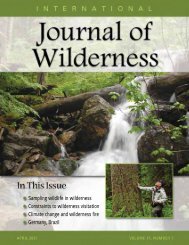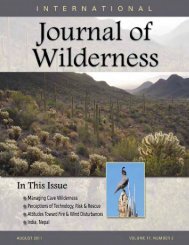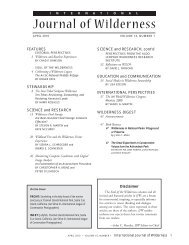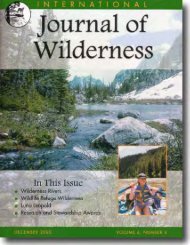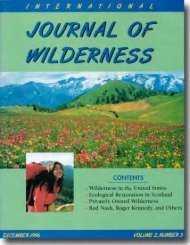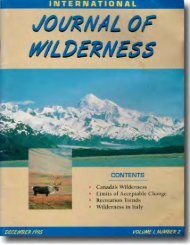Download full PDF - International Journal of Wilderness
Download full PDF - International Journal of Wilderness
Download full PDF - International Journal of Wilderness
You also want an ePaper? Increase the reach of your titles
YUMPU automatically turns print PDFs into web optimized ePapers that Google loves.
Our central point is that there is an important role for<br />
agriculture, particularly food crop production, in<br />
tropical protected area management efforts.<br />
regulations prohibit both rattan collecting<br />
and shifting cultivation, the<br />
diffuse and nomadic nature <strong>of</strong> rattan<br />
gathering and small number <strong>of</strong> forest<br />
guards makes it difficult to regulate<br />
cane harvesting. Thus, shifting cultivation<br />
in LLNP was effectively<br />
stopped, but rattan harvesting<br />
emerged as a crucial source <strong>of</strong> cash<br />
income to purchase staple foods.<br />
The cultivation <strong>of</strong> cacao is also a<br />
recent activity. In the 1970s, cacao was<br />
not cultivated in the community. However<br />
by 1999, 100% <strong>of</strong> village households<br />
had at least one parcel planted<br />
to the crop. Cacao cultivation expanded<br />
throughout Sulawesi in the<br />
1990s in response to growing market<br />
demand, high prices, desire by farmers<br />
to establish private property rights,<br />
and land purchases by local elites and<br />
migrants with capital and political<br />
connections (Li 2001).<br />
During the 1990s, household food<br />
security and general economic wellbeing<br />
became more dependent upon<br />
the price <strong>of</strong> rattan, c<strong>of</strong>fee, and cacao.<br />
C<strong>of</strong>fee and cacao exhibited extreme<br />
price volatility between 1996 and 2000<br />
(see Table 2), while the cost <strong>of</strong> rice and<br />
other household necessities (e.g., cooking<br />
oil, sugar, fish, clothing, etc.) increased.<br />
Over the five-year study<br />
period, the dollar equivalent prices <strong>of</strong><br />
rattan, c<strong>of</strong>fee, and cacao declined, even<br />
without adjusting for inflation.<br />
Informal interviews with 20 villagers<br />
in 2000 suggest that household<br />
economic conditions deteriorated<br />
over the five-year period. In 1998,<br />
households and village leaders expressed<br />
particular concern over declining<br />
food security and growing<br />
conflicts in nearby areas between<br />
migrants and long-term residents,<br />
conflicts that overlapped with ethnic<br />
and religious identities. Several experienced<br />
farmers were also concerned<br />
about the sustainability <strong>of</strong> cacao<br />
grown under <strong>full</strong>-sun conditions in<br />
former shifting cultivation fields. Finally,<br />
villagers expected social and<br />
economic conditions to worsen.<br />
The Search for Food Security<br />
and Its Implications for<br />
Forest Conservation<br />
By the late 1990s, households lacked<br />
access to sufficient forest and land resources<br />
to provide basic household<br />
food and livelihoods. Reports on conditions<br />
elsewhere in Sulawesi reveal<br />
similar patterns: food production decreased<br />
both relatively and absolutely<br />
as small holders converted former<br />
shifting cultivation land to commercial<br />
tree crops (Li 2001). Religious and<br />
Table 2—Market Prices <strong>of</strong> C<strong>of</strong>fee, Cacao and Rattan in<br />
Palu, Sulawesi (in U.S. Dollars per kg).<br />
Commodity July 1996 July 1998 July 2000<br />
C<strong>of</strong>fee $1.67 $0.90 $0.59<br />
Cacao $1.19 $1.27 $0.64<br />
Rattan (30—35 mm diameter) $1.31 $0.22 $0.27<br />
40 <strong>International</strong> <strong>Journal</strong> <strong>of</strong> <strong>Wilderness</strong> DECEMBER 2002 • VOLUME 8, NUMBER 3<br />
ethnic violence were increasing in<br />
nearby areas, while national economic<br />
and political conditions were deteriorating.<br />
Shifting cultivation and food security<br />
were distant memories for most<br />
households.<br />
Concerns over local livelihood security<br />
stimulated much discussion<br />
throughout the village, and in 1999<br />
community leaders organized the community<br />
to act. Specifically, they encouraged<br />
households to return to shifting<br />
cultivation <strong>of</strong> upland rice in an area<br />
now within LLNP, but which they had<br />
cultivated in 1980 and 1960 prior to<br />
park establishment. While farming this<br />
site is now illegal, villagers concluded<br />
that their socioeconomic condition necessitated<br />
action and that park guards<br />
had limited capacity to enforce regulations<br />
(national governmental authority<br />
declined at the local level following the<br />
resignation <strong>of</strong> Suharto in 1998).<br />
In reopening the shifting cultivation<br />
site, households agreed to several conditions:<br />
(1) the approximately 40 ha.site<br />
would be cleared and prepared<br />
collectively, (2) individual households<br />
would plant and cultivate rice based<br />
on their particular requirements, and<br />
(3) all rice produced was to be consumed<br />
locally (i.e., it would not be<br />
sold or traded). The site was cleared<br />
in the summer <strong>of</strong> 1999, burned before<br />
the onset <strong>of</strong> rains in October, immediately<br />
planted to upland rice, and<br />
harvested in late spring 2000 (see Figure<br />
1). By August 2000, the site was<br />
reverting to fallow; stumps had<br />
resprouted and secondary forest vegetation<br />
was well established. Through<br />
this effort, households secured a oneto<br />
three-year supply <strong>of</strong> rice and no<br />
longer needed to raise income to purchase<br />
it (see Figure 2). The timeliness<br />
<strong>of</strong> the undertaking was dramatic since<br />
Central Sulawesi erupted in widespread<br />
ethnic and religious violence<br />
in June 2000.



